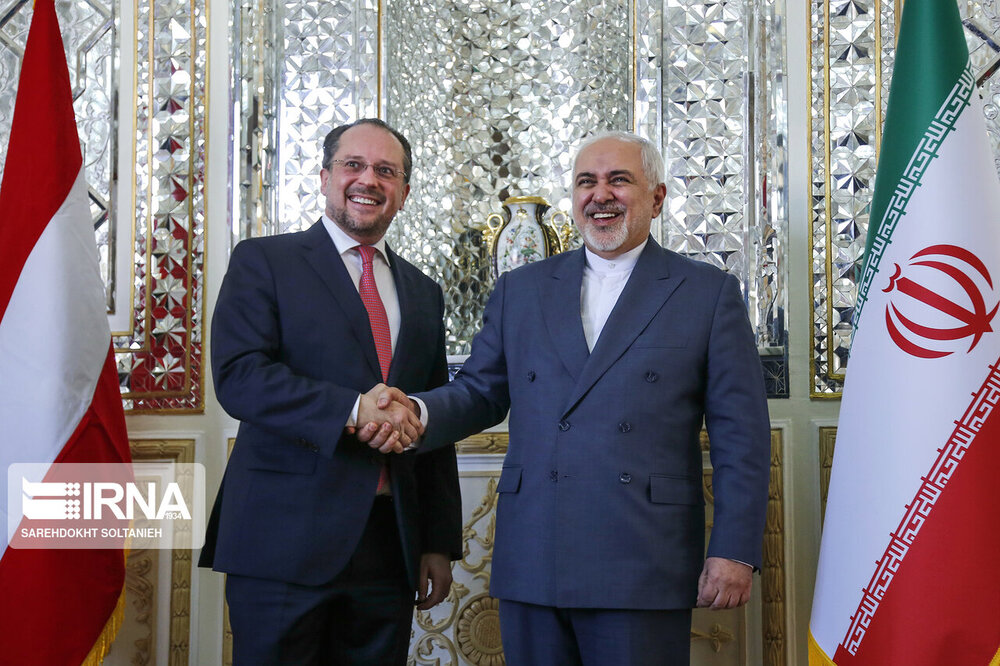Zarif discusses nuclear deal with Austrian FM

TEHRAN – Foreign Minister Mohammad Javad Zarif and his Austrian counterpart Alexander Schallenberg discussed the latest developments surrounding the 2015 nuclear deal in a meeting in Tehran on Sunday.
The two foreign minister held two rounds of talks.
The meeting took place one day after Zarif discussed regional issues and the nuclear deal, officially known as the JCPOA, with his Dutch counterpart Stef Blok who visited Iran on Friday and Saturday.
Iran is unhappy with the European Union for failing to honor its commitments under the JCPOA since Donald Trump unilaterally withdrew the U.S. from the agreement and slapped illegal sanctions against Iran.
Zarif and Schallenberg also discussed expansion of Tehran-Vienna relations and the pressing regional and international developments.
Prior to his visit to Tehran, Schallenberg had said he will be taking a “European message” to Tehran on Saturday and Sunday.
Schallenberg made the remarks after meeting his German counterpart in Berlin and also meeting the EU foreign policy chief, Josep Borrell, AP reported on Wednesday.
The Austrian chief diplomat had also said he will travel to Tehran this weekend amid efforts by European countries to keep alive Iran’s nuclear agreement with world powers.
Borrell said on February 16 that he will remain committed to keep the JCPOA alive.
“As coordinator I remain committed to listen to all sides and keep the #NuclearDeal alive,” he said in a tweet.
Zarif said on February 14 that Iran’s decisions to reduce JCPOA commitments are reversible if Europe takes “meaningful” steps in preserving the JCPOA.
Tehran’s moves to ramp-up its nuclear program in the past few months are reversible “providing that Europe takes steps that are meaningful,” Zarif told reporters on the sidelines of the Munich Security Conference, according to AP.
Borrell has said that Europe must ensure Iran’s benefits from the nuclear deal if it wants the deal to survive.
“If we want the Iran nuclear deal to survive, we need to ensure that Iran benefits if it returns to full compliance,” he wrote in an article in the Project Syndicate published on February 8.
Borrell was notified in January by Paris, London, and Berlin that they had triggered the resolution dispute mechanism.
He has said that the EU will extend indefinitely the time limit to resolve disputes in the nuclear deal to avoid having to go to the UN Security Council or triggering new sanctions.
“There is an agreement that more time is needed due to the complexity of the issues involved. The timeline is therefore extended,” Borrell said in a statement on January 24.
In May 2019 Iran started to reduce its commitments to the JCPOA at bi-monthly intervals in response to the abrogation of the pact by the U.S. coupled with the European Union’s inaction to shield Iran’s economy from sanctions.
In his meeting with the Dutch foreign minister on Saturday, President Rouhani said Iran has not closed the path of dialogue with the European Union on the JCPOA and said all must make efforts to preserve the JCPOA.
“We believe the nuclear deal was beneficial to the region and the world and the United States’ action was harmful to all, even the people of the United States. Unfortunately, during the past 21 months since the United States’ withdrawal from the JCPOA, the European Union could not take an effective step in line with implementing its commitments,” Rouhani complained.
In the meeting with Rouhani, Foreign Minister Blok said it is essential to keep the JCPOA alive as an international agreement and the Netherlands will continue efforts in this respect.
“For this purpose, we should continue dialogue and dialogue can be a solution to problems and differences,” the chief diplomat remarked.
He added, “We have told the United States privately and publicly that withdrawal from the JCPOA was not the right thing to do.”
NA/PA
